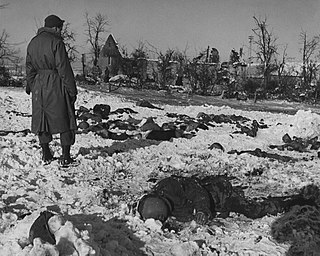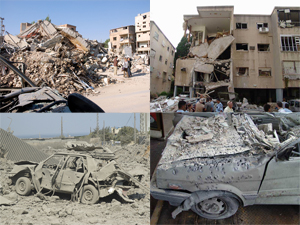
A war crime is a violation of the laws of war that gives rise to individual criminal responsibility for actions by combatants in action, such as intentionally killing civilians or intentionally killing prisoners of war, torture, taking hostages, unnecessarily destroying civilian property, deception by perfidy, wartime sexual violence, pillaging, and for any individual that is part of the command structure who orders any attempt to committing mass killings including genocide or ethnic cleansing, the granting of no quarter despite surrender, the conscription of children in the military and flouting the legal distinctions of proportionality and military necessity.

Crimes against humanity are certain serious crimes committed as part of a large-scale attack against civilians. Unlike war crimes, crimes against humanity can be committed during both peace and war and against a state's own nationals as well as foreign nationals. Together with war crimes, genocide, and the crime of aggression, crimes against humanity are one of the core crimes of international criminal law and, like other crimes against international law, have no temporal or jurisdictional limitations on prosecution.

The 2005 World Summit was a United Nations summit held between 14 and 16 September 2005 at the U.N. headquarters in New York City. It was a follow-up summit meeting to the U.N.'s 2000 Millennium Summit.
The responsibility to protect is a global political commitment which was endorsed by the United Nations General Assembly at the 2005 World Summit in order to address its four key concerns to prevent genocide, war crimes, ethnic cleansing and crimes against humanity. The doctrine is regarded as a unanimous and well-established international norm over the past two decades.
The International Commission of Inquiry on Darfur was established pursuant to United Nations Security Council Resolution 1564 (2004), adopted on 18 September 2004. The resolution, passed under Chapter VII of the United Nations Charter, urged the Secretary-General to set up an international commission to investigate human rights violations committed in Darfur. The following month, the Secretary-General appointed a five-member panel of highly regarded legal experts: chairperson Antonio Cassese, Mohammed Fayek, Hina Jilani, Dumisa Ntsebeza and Thérèse Striggner Scott.

United Nations Security Council resolution 819, adopted unanimously on 16 April 1993, after reaffirming resolutions 713 (1991) and all (1992) subsequent resolutions, the Council expressed concern at the actions of Bosnian Serb paramilitary units in towns and villages in eastern Bosnia and Herzegovina, including attacks on civilians, the United Nations Protection Force and disruption to humanitarian aid convoys. The resolution marked the UN's first civilian "safe area" being declared; it failed to prevent the Srebrenica massacre.

United Nations Security Council resolution 859, adopted unanimously on 24 August 1993, after recalling all resolutions on the situation in Bosnia and Herzegovina, the council noted that, despite all previous security council resolutions since Resolution 713 (1991), the region was still a scene of hostilities and there was little compliance with previous resolutions, particularly by the Bosnian Serb party.
An atrocity crime is a violation of international criminal law that falls under the historically three legally defined international crimes of genocide, war crimes, and crimes against humanity. Ethnic cleansing is widely regarded as a fourth mass atrocity crime by legal scholars and international non-governmental organizations (NGOs) working in the field, despite not yet being recognized as an independent crime under international law.

United Nations Security Council resolution 941, adopted unanimously on 23 September 1994, after reaffirming all resolutions on the situation in Bosnia and Herzegovina, the Council discussed violations of international humanitarian law in Banja Luka, Bijeljina and other areas of the country.

United Nations Security Council resolution 1261, adopted unanimously on 25 August 1999, in the first resolution to address the topic, the Council condemned the targeting of children in armed conflict including the recruitment and use of child soldiers.

United Nations Security Council resolution 1265, adopted unanimously on 17 September 1999, in the first resolution to address the topic, the council discussed the protection of civilians during armed conflict.

United Nations Security Council resolution 1296, adopted unanimously on 19 April 2000, after recalling Resolution 1265 (1999), the Council discussed steps to enhance the protection of civilians during armed conflict.

United Nations Security Council resolution 1314 was adopted unanimously on 11 August 2000, after recalling Resolution 1261 (1999) on children and armed conflict and other resolutions including 1265 (1999), 1296 (2000) and 1306 (2000). The Council expressed concern at the impact of conflict upon children and the use of child soldiers, and expressed willingness to consider further measures under the United Nations Charter when dealing with situations of children in armed conflict.

United Nations Security Council resolution 1366, adopted unanimously on 30 August 2001, after reaffirming resolutions 1196 (1998), 1197 (1998), 1208 (1998), 1265 (1999), 1296 (1999), 1318 (2000), 1325 (2000) and 1327 (2000) concerning aspects of armed conflict, the Council reiterated its aim to prevent armed conflict as part of its responsibility to maintain international peace and security.

United Nations Security Council resolution 1460, adopted unanimously on 30 January 2003, after recalling resolutions 1261 (1999), 1265 (1999), 1296 (2000), 1306 (2000), 1308 (2000), 1314 (2000), 1325 (2000) and 1379 (2001), the council called for the immediate end to the use of child soldiers and endorsed an "era of application" of international norms and standards for the protection of war-affected children.

United Nations Security Council Resolution 1738, adopted unanimously on December 23, 2006, after reaffirming resolutions 1265 (1999), 1296 (2000), 1502 (2003) and 1674 (2006) on the protection of civilians in armed conflict, the Council condemned attacks against journalists in conflict situations. It was the last resolution adopted by the Security Council in 2006.

United Nations Security Council Resolution 1894 was unanimously adopted on 11 November 2009.
United Nations Security Council Resolution 1820 was unanimously adopted on 19 June 2008. It condemns the use of sexual violence as a tool of war, and declares that “rape and other forms of sexual violence can constitute war crimes, crimes against humanity or a constitutive act with respect to genocide”. The adoption of the resolution marked the first time that the UN explicitly linked sexual violence as a tactic of war with women, peace, and security issues. Security Council Resolution 1820 reinforces United Nations Security Council Resolution 1325 and highlights that sexual violence in conflict constitutes a war crime and demands parties to armed conflict to immediately take appropriate measures to protect civilians from sexual violence, including training troops and enforcing disciplinary measures. In November 2010, the UN Secretary General presented a report on the implementation of UNSCR 1820.
The term international framework of sexual violence refers to the collection of international legal instruments – such as treaties, conventions, protocols, case law, declarations, resolutions and recommendations – developed in the 20th and 21st century to address the problem of sexual violence. The framework seeks to establish and recognise the right all human beings to not experience sexual violence, to prevent sexual violence from being committed wherever possible, to punish perpetrators of sexual violence, and to provide care for victims of sexual violence. The standards set by this framework are intended to be adopted and implemented by governments around the world in order to protect their citizens against sexual violence.

The Darfur genocide was the systematic killing of ethnic Darfuri people during the War in Darfur. The genocide, which was carried out against the Fur, Masalit and Zaghawa ethnic groups, led the International Criminal Court (ICC) to indict several people for crimes against humanity, rape, forced transfer and torture. An estimated 200,000 people were killed between 2003 and 2005. Other sources estimate that between 2003 and 2008, the conflict resulted in about 300,000 civilian deaths and about 2.7 million displaced civilians.















